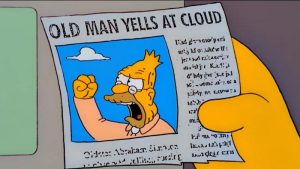Respect your elders. This is a seemingly culturally universal sentiment that is older than written language itself. For good reason too. Back in prehistoric times, any member of your species that managed to get old, was either lucky or did something right that helped them survive. A little bit of reverence wouldn’t be a bad thing, and hopefully one could learn a trick or two and increase their own chances of having similar success. So, it shouldn’t be surprising that this is also believed to be a behavioural trait found in all primates.
What also shouldn’t be surprising, is that there is at least a common perception that this respect is in decline. Moreso, there is plenty of anecdotal evidence and a mood in the zeitgeist that, worse than a decline, this has become a prejudice – with Bill Maher ranting that ageism is “the last acceptable prejudice in America“. Again, this shouldn’t be news to anyone, we’ve all seen this 15 year old Simpsons meme:

We all know about this shift in attitudes, but shouldn’t this be expected? In the last century, the changes in (especially Western) culture have been increasing rapidly. The talk of Kurzweilian Singularities —paradigm shifts so radical, they transform the culture to such an extent that it is nearly incomprehensible to those born before them— is in news and social media constantly. Previous singularities were written language, the printing press, home electricity, television, the internet, cellular communications, and so on. You’ll notice that most of the items in this list are very transformative, and very recent. Autonomous vehicles, deep learning, artificial intelligence, CRISPR-Cas9, breakthroughs in immunology, renewable energy all promise (and threaten) to change our societies in unpredictable and incomprehensible ways. Optimist or pessimists can argue whether the future is bleak or bright, but one thing is certain – it will be very different.
What does this mean for being old or the gentler euphemism elderly? The advantages came with institutional knowledge of the culture and environment are all but gone – at least in the more competitive domains of our society as elderly people can now live safely in institutions.
More Pronounced in Tech
Technology is often credited (and blamed) for the cultural deltas and their rate of increase, and Silicon Valley is often seen as its Mecca. Fittingly, the median ages in these tech companies –around 30– is about a decade lower than the US workforce as a whole – the ripe old age of 42. While Mark Zuckerburg was roundly mocked for his now infamous assertion that “Young people are just smarter” when he officially hit the ‘geezer’ age of 30, was there really any truth to it? Are young people really “smarter”?
I don’t think anyone believes this to be true, and I’m guessing that even the Zuck has had a change of tune on that one. However, there is something that younger people do seem to have an advantage at, and this is something that has been known for a while. As people get older, they tend to become more (small c) conservative, which is often linked to a more important trait (for tech, anyway), which is a decline in intellectual curiosity. This is the killer for the old fogies. One of the most critical traits in innovation is intellectual curiosity – the more curious and the more open you are to new ideas and new perspectives, the more successful you will be at innovating, and in technology, innovation is everything.
So, whether it’s rooted in biology due to a decline in neuroplasticity, or some other cultural phenomenon, it would seem logical that there are statistically more young people who are successful in highly innovative domains like technology. Does this justify ageism? Of course not. To anyone who understands bell curves, this should not be seen as a normative judgement or a prescription, just merely a possible explanation for the statistical skew.
Career Progression in Tech
As one gets more experienced in technology (a kinder euphemism for ‘older’), the common career trajectory is to move from being a programmer on a team to becoming the team lead to then becoming management. This has been no different for me. I’ve gone from a software developer to a systems architect to an IT Director in various roles as a full time employee or doing freelance work. As I moved up in responsibility, I ended up designing systems and guiding others rather than doing most of the work myself. In medium sized projects, the role of the inventor and manager are often performed by the same person. This role involves assessing the technological tools, designing the system and overseeing the execution of the design. As the projects get bigger and more complex, this is often too much for a single person to handle effectively. At that point, the tasks are split into Systems Architect and IT Director.
While these roles seem to have quite a bit of overlap, they’re conceptually different in important ways. The architect’s role is focused almost exclusively on technology – from assessing new tech (both the joy and bane of all in IT), to ensuring reliability, compatibility and feasibility of integration into existing systems. The architect spends pretty much all of his/her time communicating with highly technical people. The director, on the other hand is a step removed from the pure tech view. He/she instead focuses on the impact on the enterprise as a whole. From ensuring alignment with business goals, compliance and regulatory requirements to facilitating resources for developers and support staff, while also using software tools like understanding W2 forms that are great for supporting staff. The director often communicates with non-technical stakeholders (including partners and customers), as well technical people who can help you handle install your VOIP systems.
Why this blog post now?
Recently, I was asked that if I had a choice for only one of these positions –Architect or Director– which would I prefer? I thought I knew the answer right away: “Architect! No, Director! No! Archi… Hrmm.”. I’ve now spent a couple of days on it, and I still go back and forth a bit. Here’s how I see the pros of each job:
Architect
As a technical person myself, I enjoy the energy and feedback I get from other technical people. It’s creative, thought provoking and almost always intellectually stimulating. The pace is fast, and often there’s a lot of pressure to perform, and honestly, I perform well under pressure – I almost prefer it. I see being a systems architect is like being a surfer at the top of a big wave.
Director
While the pace is often slower for the director, the diversity in the types of people is much greater. Also, many of the issues the director must deal with are human issues – from personality conflicts, to inspiring people, building trust and relationships. I have come to find that I quite enjoy these sometimes complex interpersonal exchanges, especially when I can motivate and empower talented people to do their best. A successful director is a people person – a coach, a mentor and a leader.
Time to decide!
While, I don’t think I’m ready to be put to pasture quite yet (Sorry, Zuck!), and I still have plenty of energy for innovating and riding the technology wave, I see my longer career goals as a director. I’m pretty sure I would love the pressure and pacing of the architect for some time to come, but there are brief moments of foreboding. A cup of coffee often makes those pass, but the thought that it just won’t one day does linger.
As to being a director, despite IT people having the stigma of being anti-social, I quite enjoy team building and co-operation with others. Much to my surprise, the governance, compliance and regulatory work that I have been focusing a lot on in the last couple of years has been more interesting than I would have ever expected. This seems like the natural progression of where I want to be eventually, and if that came sooner rather than later, I would be totally fine with it.
I guess the best part of this is that either way, I really enjoy my work, and I feel quite fortunate to be in such an intellectually stimulating field. The cliché expression: “Choose a job you love, and you will never have to work a day in your life” is ringing truer all the time.

